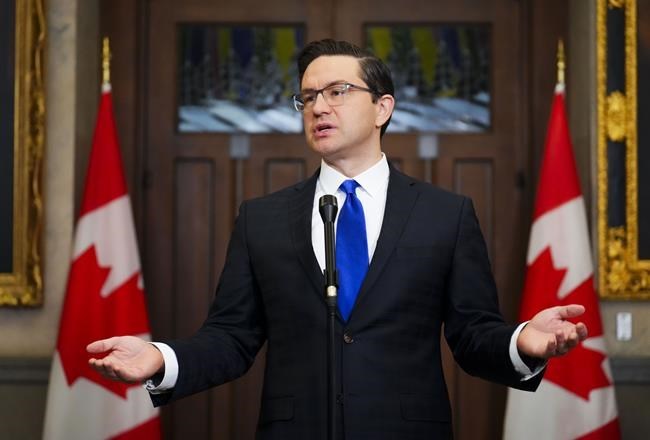ONTARIO — Conservative Leader Pierre Poilievre doubled down on his belief that "everything feels broken" in Canada Friday, as he laced into Prime Minister Justin Trudeau for suggesting otherwise.
At the start of a two-day caucus retreat to plot out their priorities when the House of Commons resumes sitting next week, Poilievre asked Tory MPs: "What's happening in our country?"
His speech offered a blistering review of Trudeau's nearly eight years in power, listing off the ways he believes Canadians are hurting — from high prices at the grocery store to crime that he characterized as out of control — and areas where he believes the government is failing. He cited the recent holiday travel chaos as an example of that.
"Everything feels broken," said Poilievre. "Oh — I just offended Justin Trudeau. He gets very angry when I talk about these problems."
He pointed to Trudeau's comments at the annual Liberal holiday party last month, where the prime minister countered the Conservative leader's message by telling his own supporters, "Canada is not broken."
Poilievre charged that Trudeau is unable to see how much people are suffering, saying their problems are Trudeau's fault alone.
"You told us that better was always possible," said Poilievre. "And yet everything is worse."
He then suggested if Trudeau is unwilling to fix the country's woes, he should "get out of the way and let someone lead who can." That comment was greeted with cheers from his caucus.
For his part, Trudeau responded to Poilievre's remarks on his way into the Liberal caucus meeting by saying the Conservative leader was amplifying people's anger, rather than "offering them solutions."
Poilievre's speech emphasized the issue of crime, saying cities are becoming "crime zones" under Trudeau's watch and suggesting he is not taking the necessary action to reduce violence.
Poilievre named Toronto as an example after a string of violent incidents on the city's transit system in recent weeks.
A Statistics Canada report released last November shows the country's homicide rate increased for the third consecutive year, with cities like Winnipeg and Regina boasting the worst rates per capita. The crime severity index was down in 2021 and 2020 after five years of increases.
Poilievre enters the upcoming parliamentary sitting — his second since winning the party's leadership last fall — having just wrapped a stretch of campaign-like stops in Quebec, northern Ontario, Winnipeg and Vancouver.
And if his first few months in leadership were focused on transitioning into the office, he's now well into the business of managing a 116-person caucus.
That is not without its issues. This week, at Poilievre's direction, the party whip informed MPs they were to lead by example in showing fiscal responsibility by ending the practice of having taxpayers pay for home internet services.
The House of Commons allows members to be reimbursed for those expenses through their office budgets, but the Tories asked their MPs and staff to stop.
Emails obtained by The Canadian Press show that several rural MPs voiced their displeasure, asking the office to hold off on making a policy change until the caucus met Friday to talk. That ultimately did not happen.
Asked about those concerns, Poilievre's spokesman Sebastian Skamski referred to an earlier statement provided by chief Opposition whip Kerry-Lynne Findlay, who said the change was made in light of the high cost of living.
Poilievre has also released several policy statements in the past week, including an announcement that he planned consultations with First Nations about increasing their access to revenues from resources developed on their land.
This report by The Canadian Press was first published Jan. 27, 2023.
Stephanie Taylor, The Canadian Press


